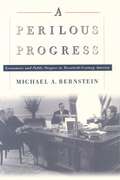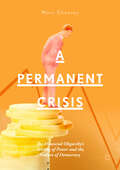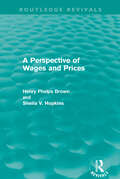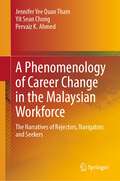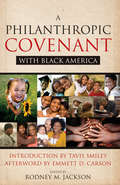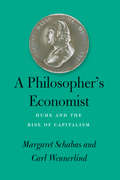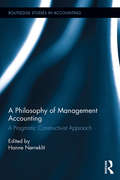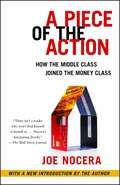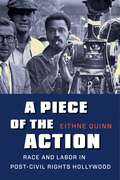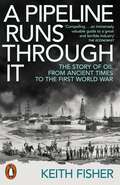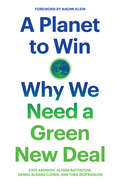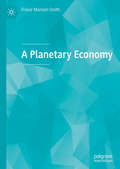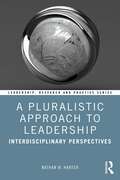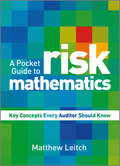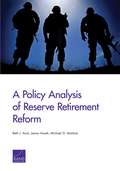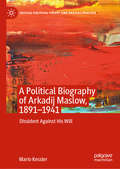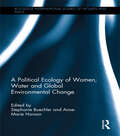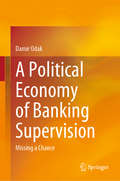- Table View
- List View
A Perfect Fit: How Lena “Lane” Bryant Changed the Shape of Fashion
by Mara RockliffDiscover how the Lane Bryant clothing brand changed the way we buy clothes forever by celebrating bodies of all shapes and sizes in this inclusive picture book biography of a Lithuanian immigrant with a brilliant eye for fashion and business. With stunning artwork from Sibert medalist Juana Martinez-Neal.Lena came to America with nothing but a dream—and an exceptional ability to drape and snip and stitch. She never used a pattern or a tape measure, but every dress she sewed turned out to be a perfect fit.Then, one day, a customer presented her with a new challenge. Could she design a stylish, comfortable gown for a body shape that did not meet the current standards of fashion?Lena took the challenge. Under the company name Lane Bryant, she became famous for flattering and modish clothing designed for all different shapes and sizes. The world of fashion would never be the same.
A Perfect Mess: The Hidden Benefits Of Disorder
by Eric Abrahamson David H. FreedmanHow Crammed Cupboards, Cluttered Offices, and Off-the-Cuff Planning make the World a Better Place.Like the bestselling Freakonomics or Blink, here is a book that combines a professor's expertise with stories from everyday life to provide a striking new view of how our world works. Ever since Einstein's study of Brownian Motion, scientists have understood that a little disorder actually makes systems more effective. But most people still shun disorder, or suffer guilt over the mess they can't avoid. No longer! With a spectacular array of anecdotes and case studies of the useful role mess can play, here is an antidote to the accepted wisdom that tight schedules, neatness and consistency are the keys to success. Drawing on examples from business, parenting, cooking, the war on terrorism, retail and even the meteoric career of Arnold Schwarzenegger, co-authors Abrahamson and Freedman demonstrate that moderately messy systems use resources more efficiently, yield better solutions and are harder to break than neat ones. A PERFECT MESS will help readers assess what the right amount of disorder is for a given system, and how to apply these ideas on to a large scale - government or society - and on a small scale - in your attic, kitchen or office. A PERFECT MESS will forever change the way we think about those unruly heaps of paper on our desks.
A Perfect Score: The Art, Soul, and Business of a 21st-Century Winery
by Craig Hall Kathryn HallA lively husband and wife team recounts their twenty-year climb from amateur winemakers to recipients of an almost unheard-of perfect score from Robert Parker's Wine Advocate.Kathryn and Craig Hall launched themselves head first into Napa Valley 20 years ago with the purchase of an 1885 winery and never looked back. Since the couple's purchase of their debut winery, their critically acclaimed HALL Wines and WALT Wines have become fixtures of the California wine industry, winning numerous accolades including a coveted 100-point "perfect score." A PERFECT SCORE weaves a vibrant tale of the HALL brand's meteoric rise to success, Napa Valley's tug-of-war between localism and tourism, and the evolving nature of the wine industry as a whole. Readers who love a good glass of wine will find much to savor in the Halls' expert account of the art, soul, and business of a modern winery.
A Perilous Progress: Economists and Public Purpose in Twentieth-Century America
by Michael A. BernsteinThe economics profession in twentieth-century America began as a humble quest to understand the "wealth of nations." It grew into a profession of immense public prestige--and now suffers a strangely withered public purpose. Michael Bernstein portrays a profession that has ended up repudiating the state that nurtured it, ignoring distributive justice, and disproportionately privileging private desires in the study of economic life. Intellectual introversion has robbed it, he contends, of the very public influence it coveted and cultivated for so long. With wit and irony he examines how a community of experts now identified with uncritical celebration of ''free market'' virtues was itself shaped, dramatically so, by government and collective action. In arresting and provocative detail Bernstein describes economists' fitful efforts to sway a state apparatus where values and goals could seldom remain separate from means and technique, and how their vocation was ultimately humbled by government itself. Replete with novel research findings, his work also analyzes the historical peculiarities that led the profession to a key role in the contemporary backlash against federal initiatives dating from the 1930s to reform the nation's economic and social life. Interestingly enough, scholars have largely overlooked the history that has shaped this profession. An economist by training, Bernstein brings a historian's sensibilities to his narrative, utilizing extensive archival research to reveal unspoken presumptions that, through the agency of economists themselves, have come to mold and define, and sometimes actually deform, public discourse. This book offers important, even troubling insights to readers interested in the modern economic and political history of the United States and perplexed by recent trends in public policy debate. It also complements a growing literature on the history of the social sciences. Sure to have a lasting impact on its field, A Perilous Progress represents an extraordinary contribution of gritty empirical research and conceptual boldness, of grand narrative breadth and profound analytical depth.
A Permanent Crisis: The Financial Oligarchy’s Seizing of Power and the Failure of Democracy
by Marc ChesneyThis short book describes the role big banks played in the financial crisis of 2008 while denouncing the financial oligarchy’s seizing of power and the dangers it represents for democracy today. There have been many books since the financial crisis that have considered historical events leading up to the crisis but few that consider a solution. Ten years after the great financial crash, this book synthesises the historical developments and introduces a proposal aimed at rebalancing the economy and society at large. The author presents a novel solution that would change current tax systems in the developed world, in their entirety.This book will be of interest to students, practitioners and researchers, as well as the wider informed audience.
A Perspective of Wages and Prices (Routledge Revivals)
by Henry Phelps Brown Sheila V. HopkinsFirst published in book form in 1981, this collection of essays originally written between 1955 and 1966 contains ground-breaking research and analysis on the study of wages and prices across seven centuries, with particular reference to builder’s wage rates and the price of a bundle of the commodities on which these wages might be spent. These seminal contributions to the economics of labour and economic growth did much to fuel the debate surrounding the problems of inflation, stability and changes in the purchasing power of money upon the book’s initial publication. These concerns are every bit as relevant in today’s post credit-crunch society and this reissue will be welcomed by all students of economic history and labour economics.
A Phenomenology of Career Change in the Malaysian Workforce: The Narratives of Rejectors, Navigators and Seekers
by Pervaiz K. Ahmed Jennifer Yee Tham Yit Sean ChongEvolution in economy, technology and social institutions over time have given rise to boundaryless and Protean careers that promote mobility and self-direction in managing one’s career. This has led to the phenomenon of career change whereby individuals undertake a shift from one field of work to a completely different field of work. In career change research, career changers have been studied as a collective, singular group undergoing a similar change experience, which neglects individual differences that may contrast the experience of change from one changer to another. Furthermore, the emotional experience that accompanies a career change has been examined with a primary focus on the role of positive emotions, which overlooks the role of negative emotions in career change. Thus, this book sheds light on three key narratives of career change; Rejectors, Navigators and Seekers, that were identified in a phenomenological study of career change amongst Malaysian working adults. Semi-structured interviews were conducted with 30 career changers across age, gender and ethnicity with a focus on how they made sense and meaning of their lived experience of career change within their environment and context. Each career change narrative was found to have different characteristics, motivations and behaviors respectively, which shaped their unique career change process. Negative emotions were also revealed as key drivers of the career change process, although each narrative expressed different types of negative emotions.Finally, the book also introduces an adaptive perspective to career development by way of the Adaptive Career Construal Model (ACCM) which was proposed based on the continuous bi-directional relationship between career decisions and career outcomes.
A Philanthropic Covenant with Black America
by Tavis Smiley Rodney Jackson Emmett D. CarsonA Philanthropic Covenant will feature eight essays from several prominent African American grantmakers, scholars, activists and clergy that will examine critical elements of modern philanthropy and how they affect Black communities for good and for ill. Each chapter will include statistical documentation of the issues, strategic recommendations to improve the quality of Black life, and examples of outstanding models already being practiced throughout the country. A Philanthropic Covenant is intended to inform individuals, grantors, religious organizations, fundraisers and youth how philanthropy--time, talent and treasure--can be strategically mobilized to assist Black communities in dealing more effectively with the issues outlined in The Covenant with Black America. Throughout the book, emphasis will be placed on the role, responsibilities and potential of African Americans and African-American philanthropy, in particular, to affect positive change in their own communities.
A Philosopher's Economist: Hume and the Rise of Capitalism
by Margaret Schabas Carl WennerlindAlthough David Hume’s contributions to philosophy are firmly established, his economics has been largely overlooked. A Philosopher’s Economist offers the definitive account of Hume’s “worldly philosophy” and argues that economics was a central preoccupation of his life and work. Margaret Schabas and Carl Wennerlind show that Hume made important contributions to the science of economics, notably on money, trade, and public finance. Hume’s astute understanding of human behavior provided an important foundation for his economics and proved essential to his analysis of the ethical and political dimensions of capitalism. Hume also linked his economic theory with policy recommendations and sought to influence people in power. While in favor of the modern commercial world, believing that it had and would continue to raise standards of living, promote peaceful relations, and foster moral refinement, Hume was not an unqualified enthusiast. He recognized many of the underlying injustices of capitalism, its tendencies to promote avarice and inequality, as well as its potential for political instability and absolutism. Hume’s imprint on modern economics is profound and far reaching, whether through his close friend Adam Smith or later admirers such as John Maynard Keynes and Friedrich Hayek. Schabas and Wennerlind’s book compels us to reconsider the centrality and legacy of Hume’s economic thought—for both his time and ours—and thus serves as an important springboard for reflections on the philosophical underpinnings of economics.
A Philosophy of Management Accounting: A Pragmatic Constructivist Approach (Routledge Studies in Accounting)
by Hanne NørreklitThe book introduces pragmatic constructivism as a paradigm for understanding actors’ construction of functioning practice and for developing methods and concepts for managing and observing that practice. The book explores, understands and theorises organisational practices as constructed through the activities of all organisational actors. Actors always act under presumptions of a specific actor-world-relation which they continuously construct, adjust and reconstruct in light of new experiences, contexts and communication. The outcome of the actor-world-relation is a reality construction. The reality construction may function successfully or it may be hampered by fictitious and illusionary elements, due to missing or faulty actor-world relations. The thesis is that four dimensions of reality – facts, possibilities, values and communication – must be integrated in the actor-world-relation if the construct is to form a successful basis for effective, functioning actions. Drawing on pragmatic constructivism, the book provides concepts and ideas for studies regarding actors and their use of management accounting models in their construction of organized reality. It concentrates on researching and conceptualizing what creates functioning reality construction. It develops concept and methods for understanding, analysing and managing the actors’ reality constructions. It is intended for people who do research on or work actively with developing management accounting.
A Piece of the Action: How the Middle Class Joined the Money Class
by Joseph NoceraWinner of the Helen Bernstein Award for Excellence in Journalism. One of "Business Week"s "Ten Best Business Books of the Year". When it was published in 1994, "A Piece of the Action" was wildly acclaimed by "Fortune," "The Wall Street Journal," authors Michael Lewis and Brian Burroughs; it won the Helen Bernstein Prize and was a national bestseller. Joseph Nocera describes the historical process by which millions of middle class Americans went from being savers--people who kept their money in the bank, and spent it frugally--to being unrepentant borrowers and investors. "A Piece of the Action" is an important piece of financial and social history, and with a new introduction, Noceras 2013 critique of the uses of the revolution is a powerful warning and admonition to understand what is at stake before we act, to look before we jump.
A Piece of the Action: Race and Labor in Post–Civil Rights Hollywood
by Eithne QuinnHollywood is often thought of—and certainly by Hollywood itself—as a progressive haven. However, in the decade after the passage of the Civil Rights Act, the film industry grew deeply conservative when it came to conflicts over racial justice. Amid black self-assertion and white backlash, many of the most heated struggles in film were fought over employment. In A Piece of the Action, Eithne Quinn reveals how Hollywood catalyzed wider racial politics, through representation on screen as well as in battles over jobs and resources behind the scenes.Based on extensive archival research and detailed discussions of films like In the Heat of the Night, Sweet Sweetback’s Baadasssss Song, Super Fly, Claudine, and Blue Collar, this volume considers how issues of race and labor played out on the screen during the tumultuous early years of affirmative action. Quinn charts how black actors leveraged their performance capital to force meaningful changes to employment and film content. She examines the emergence of Sidney Poitier and other African Americans as A-list stars; the careers of black filmmakers such as Melvin Van Peebles and Ossie Davis; and attempts by the federal government and black advocacy groups to integrate cinema. Quinn also highlights the limits of Hollywood’s liberalism, showing how predominantly white filmmakers, executives, and unions hid the persistence of racism behind feel-good stories and public-relations avowals of tolerance. A rigorous analysis of the deeply rooted patterns of racial exclusion in American cinema, A Piece of the Action sheds light on why conservative and corporate responses to antiracist and labor activism remain pervasive in today’s Hollywood.
A Pioneer of Management Research and Education in Japan: Challenges from Kobe University Business School
by Izumi Mitsui Norio Kambayashi Kyohei HiranoThe purpose of this book is to clarify the mission and history of Kobe University Business School (KUBS), not only for the development of management education but also for the familiarization of industry in Japan with the ideas of modern management. Kobe University was the first in Japan to establish a faculty of business administration and has continued to conduct research and education in the field to this day. Under the influence of Germany and the USA, the academic area of management in Japan has achieved unique development not witnessed in other countries. Since 1902, when its predecessor, Kobe Higher Commercial School, was established, KUBS has been a pioneer of research and education in management studies in Japan by overcoming many obstacles and difficulties.Even now in the age of globalization, the spirit of innovation and liberal academic style, from the time of its establishment, are inherent in KUBS, and the faculty members have made great efforts to be innovative in management studies. This book aims to explore the mission and history of KUBS and to elucidate the development process of Japanese-style management research and education by introducing the diverse areas of management studies and the profiles of researchers.
A Pipeline Runs Through It: The Story of Oil from Ancient Times to the First World War
by Keith Fisher'Fascinating revelations' Max Hastings, Sunday Times'An immensely valuable guide to a great and terrible industry' The Economist 'The book I have long been waiting for... Essential reading' Michael KlarePetroleum has always been used by humans: as an adhesive by Neanderthals, as a waterproofing agent in Noah's Ark and as a weapon during the Crusades. Its eventual extraction from the earth in vast quantities transformed light, heat and power. A Pipeline Runs Through It is a fresh, in-depth look at the social, economic, and geopolitical forces involved in our transition to the modern oil age. It tells an extraordinary origin story, from the pre-industrial history of petroleum through to large-scale production in the mid-nineteenth century and the development of a dominant, fully-fledged oil industry by the early twentieth century.This was always a story of imperialist violence, economic exploitation and environmental destruction. The near total eradication of the Native Americans of New York, Pennsylvania and Ohio has barely been mentioned as a precondition for the emergence of the first oil region in the United States. The growth of Royal Dutch-Shell involved the genocidal subjugation of people of the Dutch East Indies and the exploitation of oil in the Middle East arose seamlessly out of Britain's prior political and military interventions in the region. Finally, in an entirely new analysis, the book shows how the British navy's increasingly desperate dependence on vulnerable foreign sources of oil may have been a catalytic ingredient in the outbreak of the First World War.The rise of oil has shaped the modern world, and this is the book to understand it.
A Planet to Win: Why We Need a Green New Deal (Jacobin)
by Kate Aronoff Alyssa Battistoni Daniel Aldana Cohen Thea RiofrancosIn the twenty-first century, all politics are climate politics.The age of climate gradualism is over, as unprecedented disasters are exacerbated by inequalities of race and class. We need profound, radical change. A Green New Deal can tackle the climate emergency and rampant inequality at the same time. Cutting carbon emissions while winning immediate gains for the many is the only way to build a movement strong enough to defeat big oil, big business, and the super-rich—starting right now.A Planet to Win explores the political potential and concrete first steps of a Green New Deal. It calls for dismantling the fossil fuel industry and building beautiful landscapes of renewable energy, guaranteeing climate-friendly work and no-carbon housing and free public transit. And it shows how a Green New Deal in the United States can strengthen climate justice movements worldwide. We don&’t make politics under conditions of our own choosing, and no one would choose this crisis. But crises also present opportunities. We stand on the brink of disaster—but also at the cusp of wondrous, transformative change.
A Planetary Economy
by Fraser Murison SmithThis book asks, how would a stable, prosperous economy of the future look if one started with a blank sheet of paper? Given that the world’s economy is locked into a coevolution with nature, the urgency of this question is brought into stark relief by the 2020 coronavirus pandemic and ongoing climate change. While physical technologies to build such an economy mostly exist, the social technologies, in the form of institutions, governance and policies, do not. The development of these social technologies will necessitate a reconsideration of economic norms: in particular, what is the economy for, and what are we, as actors within it, striving for? This book integrates normative, institutional, political and economic requirements into a systematic framework to drive our present growth economy toward a future planetarian one. It outlines a suite of interrelated policies to increase the economy’s material efficiency, establish a basic living standard, and reform the money system, while along the way eliminating economic debt and balancing government budgets. The framework and policies together form a paradigm of market planetarianism: the idea that the power of markets may be used to steer the economy toward a desired long-term goal. The methodological aspects of this paradigm are covered in the companion volume, Economics of a Crowded Planet.
A Pluralistic Approach to Leadership: Interdisciplinary Perspectives (Leadership: Research and Practice)
by Nathan W. HarterThis thought-provoking book adopts a pluralistic framework to examine leadership and raises important questions about how leadership studies scholars see and do their work.This book begins with an interdisciplinary discussion of what a pluralistic mindset is – a distinct framework for acknowledging and managing a diversity of opinions while retaining an abiding faith in the merits of rigorous investigation. Nathan W. Harter argues that pluralism is an important consideration for leadership scholars, and threads this throughout a series of chapters that explore such topics as the proper duration of leadership episodes, the benefits of dedifferentiation in leadership, the importance of grievance as a motive, the prevalence of noise in decision-making, and the evolving utility of OODA loops. It concludes with a phenomenological experience in the spirit of Michel Serres that considers the role of leadership amid a welter of multiplicities. Throughout, readers are introduced to a number of scholars whose work is not often cited in leadership literature, including Julia Kristeva, Richard McKeon, Pierre Hadot, Eric Voegelin, and John Boyd.Bringing together important lessons and themes from literature, philosophy, and social science, this book offers a novel approach to leadership studies for advanced students and scholars.
A Pocket Guide to How to Start a Successful Group Home
by Yalonda Smith<p>Do you have a dream of opening your own group home, but do not know where to start? Have you contacted your local licensing agency to get the information on starting your group home but instead received vague and discouraging information? Did they tell you the licensing process may take up to one year and you do not understand why? Or are you just plain frustrated in trying to figure this thing out alone? All of these barriers add months to the licensing process! If you are like I was when I went through this process and want to cut through the red tape of the licensing process, this book is for you!! <p>My name is Yalonda Smith (You may know me as Yalonda Hooks), and I owned a successful group home for foster children of my own for 7 years. I am the CEO of Cornerstone Consulting & Coaching, LLC, formerly known as, How to Start a Successful Group Home, LLC. I started my web-based consulting business in 2009 and have been helping others to make their dreams come true ever since! You may have visited my website while doing your research over the years but have procrastinated and put your dreams of entrepreneurship on hold year after year. It is time to stop making excuses and make this season, YOUR season!!! <p>The purpose of this book is to save people like you many months of research, writing, and creating your own policies and forms. When I was in your shoes in 2006 trying to open my own group home, I was impatient and frustrated with the complications of the licensing process. Therefore, I am offering you a step by step guide that will help make your dreams a reality in no time! Although this book is mainly for the licensing process in the United States, the basic steps can be used in any country that must be licensed through the government to open a group home or residential facility. Why delay? Let's start working on making your dreams a reality today!</p>
A Pocket Guide to Risk Mathematics
by Matthew LeitchThis uniquely accessible, breakthrough book lets auditors grasp the thinking behind the mathematical approach to risk without doing the mathematics.Risk control expert and former Big 4 auditor, Matthew Leitch, takes the reader gently but quickly through the key concepts, explaining mistakes organizations often make and how auditors can find them.Spend a few minutes every day reading this conveniently pocket sized book and you will soon transform your understanding of this highly topical area and be in demand for interesting reviews with risk at their heart."I was really excited by this book - and I am not a mathematician. With my basic understanding of business statistics and business risk management I was able to follow the arguments easily and pick up the jargon of a discipline akin to my own but not my own."--Dr Sarah Blackburn, President at the Institute of Internal Auditors - UK and Ireland
A Pocketful of Holes and Dreams
by Jeff PearceThe poor boy who made his fortune . . . not just once but twice.Little Jeff Pearce grew up in a post-war Liverpool slum. His father lived the life of an affluent gentleman whilst his mother was forced to steal bread to feed her starving children. Life was tough and from the moment Jeff could walk he learned to go door to door, begging rags from the rich, which he sold down the markets. Leaving school at the age of fourteen, he embarked on an extraordinary journey, and found himself, before the age of thirty, a millionaire.Then, after a cruel twist of fate left him penniless, he, his wife and children were forced out of their beautiful home . . .With nothing but holes in his pockets, Jeff had no alternative but to go back down the markets and start all over again. Did he still have what it took? Could he really get back everything he had lost?A Pocketful of Holes and Dreams is the heartwarming true story of a little boy who had nothing but gained everything and proof that, sometimes, rags can be turned into riches . . .______________'An inspirational tale of hard work and determination' 5* Reader review 'I just loved this book from the first chapter - I was gripped' 5* Reader review
A Policy Analysis of Reserve Retirement Reform
by James Hosek Beth J. Asch Michael G. MattockAs the defense burden borne by reserve forces has increased, more attention has been paid to differences between retirement systems for the reserve and active components. This report analyzes the systems, discusses the importance of structuring compensation to enable management flexibility, considers obstacles and how they might be overcome, and provides a quantitative assessment of the reserve retention and cost effects of possible proposals.
A Political Biography of Arkadij Maslow, 1891-1941: Dissident Against His Will (Critical Political Theory and Radical Practice)
by Mario KesslerThis book is a political biography of Arkadij Maksimovich Maslow (1891-1941), a German Communist politician and later a dissident and opponent to Stalin. Together with his political and common-law marriage partner, Ruth Fischer, Maslow briefly led the Communist Party of Germany, the KPD, and brought about its submission to Moscow. Afterwards Fischer and Maslow were removed from the KPD leadership in the fall of 1925 and expelled from the party a year later. Henceforth they both lived as communist outsiders—persecuted by both Hitler and Stalin. Maslow escaped to Cuba via France and Portugal and was murdered under dubious circumstances in Havana in November 1941. He died as a communist dissident committed to the cause of a radical-socialist labor movement that lay in ruins. Kessler considers Maslow's role in pivotal events such as the Bolshevik Revolution, in Soviet revolutionary parties and organizations, through to the rise of Stalinism and Cold War anti-communism. What results is a deep dive into the life of a key yet understudied figure in dissident communism.
A Political Ecology of Women, Water and Global Environmental Change (Routledge International Studies of Women and Place)
by Stephanie Buechler Anne-Marie S. HansonThis edited volume explores how a feminist political ecology framework can bring fresh insights to the study of rural and urban livelihoods dependent on vulnerable rivers, lakes, watersheds, wetlands and coastal environments. Bringing together political ecologists and feminist scholars from multiple disciplines, the book develops solution-oriented advances to theory, policy and planning to tackle the complexity of these global environmental changes. Using applied research on the contemporary management of groundwater, springs, rivers, lakes, watersheds and coastal wetlands in Central and South Asia, Northern, Central and Southern Africa, and South and North America, the authors draw on a variety of methodological perspectives and new theoretical approaches to demonstrate the importance of considering multiple layers of social difference as produced by and central to the effective governance and local management of water resources. This unique collection employs a unifying feminist political ecology framework that emphasizes the ways that gender interacts with other social and geographical locations of water resource users. In doing so, the book further questions the normative gender discourses that underlie policies and practices surrounding rural and urban water management and climate change, water pollution, large-scale development and dams, water for crop and livestock production and processing, resource knowledge and expertise, and critical livelihood studies. This book will be of interest to students and scholars of environmental studies, development studies, feminist and environmental geography, anthropology, sociology, environmental philosophy, public policy, planning, media studies, Latin American and other area studies, as well as women’s and gender studies.
A Political Economy of American Hegemony
by Thomas OatleyIn A Political Economy of American Hegemony, Thomas Oatley explores how America's military buildups have produced postwar economic booms that have culminated in monetary and financial crises. The 2008 subprime crisis - as well as the housing bubble that produced it - was the most recent manifestation of this buildup, boom, and bust cycle, developing as a consequence of the decision to deficit-finance the wars in Afghanistan and Iraq. Earlier instances of financial crises were generated by deficit-financed buildups in the 1980s and the late 1960s. The buildup, boom, and bust pattern results from the way political institutions and financial power shape America's response to military challenges: political institutions transform increased military spending into budget deficits, and financial power enables the United States to finance these deficits by borrowing cheaply from the rest of the world. Oatley examines how this cycle has had a powerful impact on American and global economic and financial performance.
A Political Economy of Banking Supervision: Missing a Chance
by Damir OdakThis book examines the effect of banking on the real economy and society, focusing on banking supervision as the decisive factor in steering banking activities and determining the social outcome of the game of finance. Banking is like a cardiovascular system for our society. If it functions correctly, it allows the economy to operate smoothly. On the other hand, if it malfunctions it becomes a doomsday device. This creates an asymmetry of risks – the asymmetry between the potential dire consequences and the modest rewards of accepting those risks. Banking was one of the critical technological factors enabling the transition from the middle ages and the creation of modern society. However, while today it contributes little to economic growth, its malfunction has a profound and lasting adverse impact.The book explains why, how and what. Why is it important to keep tight supervision of the banks? How can banking supervision improve stability, not only of the financial system but also of the whole human society? What went wrong with the regulation in the past?



